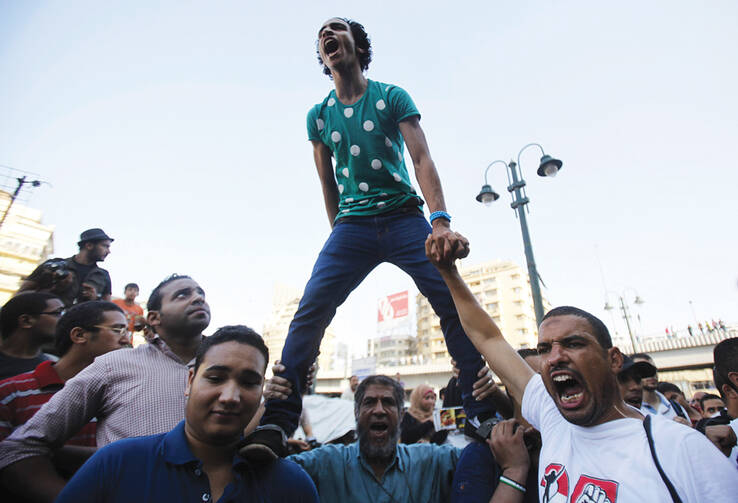A Catholic bishop in Luxor, about 400 miles south of Cairo, said Muslims and Christians are afraid to leave their homes because of insecurity in the streets. On Aug. 20 Coptic Catholic Bishop Youhannes Zakaria of Luxor said, “I’m crying for all these simple people—Muslims and Christians—who live in the villages nearby and don’t have anything because their food supplies are running out and people are afraid to leave their homes.
“Even those who are well off can’t buy food because all the shops are closed,” he said. The next day, Bishop Zakaria said that some of the soldiers had brought him bread, and the tensions in the city seemed to be lessening after the arrests of some of the leaders of the Muslim Brotherhood.
On Aug. 21 Human Rights Watch urged Egyptian authorities to take “the necessary steps to protect churches and religious institutions against mob attacks.” The group said authorities should also investigate why security forces were largely absent or failed to intervene even when they had been informed of ongoing attacks. The group reports that immediately following the violent dispersal of the Muslim Brotherhood sit-ins in Cairo on Aug. 14, crowds of men attacked at least 42 churches, burning or damaging 37, as well as dozens of other Christian religious institutions in the governorates of Minya, Asyut, Fayum, Giza, Suez, Sohag, Bani Suef and North Sinai. H.R.W. has verified that at least three Coptic Christians and one Muslim were killed as a result of sectarian attacks in Dalga, Minya and Cairo.
“For weeks, everyone could see these attacks coming, with Muslim Brotherhood members accusing Coptic Christians of a role in Mohamed Morsi’s ouster, but the authorities did little or nothing to prevent them,” said Joe Stork, H.R.W.’s acting Middle East director. “Now dozens of churches are smoldering ruins, and Christians throughout the country are hiding in their homes, afraid for their very lives.”
Demonstrations began in Luxor a few days after the military crackdown in Cairo. “After being chased from the center of Luxor, the pro-Morsi demonstrators arrived under my residence shouting, ‘Death to the Christians,’” Bishop Zakaria said. “Fortunately, the police arrived in time to save us. Now the police and the army have two armored vehicles parked here.”
The bishop said the Muslim Brotherhood is going after Christians because “they think Christians are the cause of Morsi’s fall. It’s true that Christians participated in the demonstrations against Morsi, but 30 million Egyptians—most of them Muslims—took to the streets against the deposed president,” he said.
“By attacking Christians, they want to throw Egypt into chaos,” Bishop Zakaria said.
Egypt’s Coptic Catholic Church has said it supports the country’s military in the face of what it calls “a war on terror” against the Muslim Brotherhood. The Muslim Brotherhood has denied using violence in its campaign to restore Morsi to office.
On Aug. 20, Egypt’s Coptic Catholic Patriarch Ibrahim Isaac Sidrak sent condolences to the families of soldiers killed in an Aug. 18 attack in the country’s Sinai region. He called the dead soldiers “martyrs.” He did not mention at least 35 prisoners who died in a prison van in Cairo on Aug. 18. Egyptian security says they were killed trying to escape, but Brotherhood members and other opposition forces say they were killed in cold blood.








